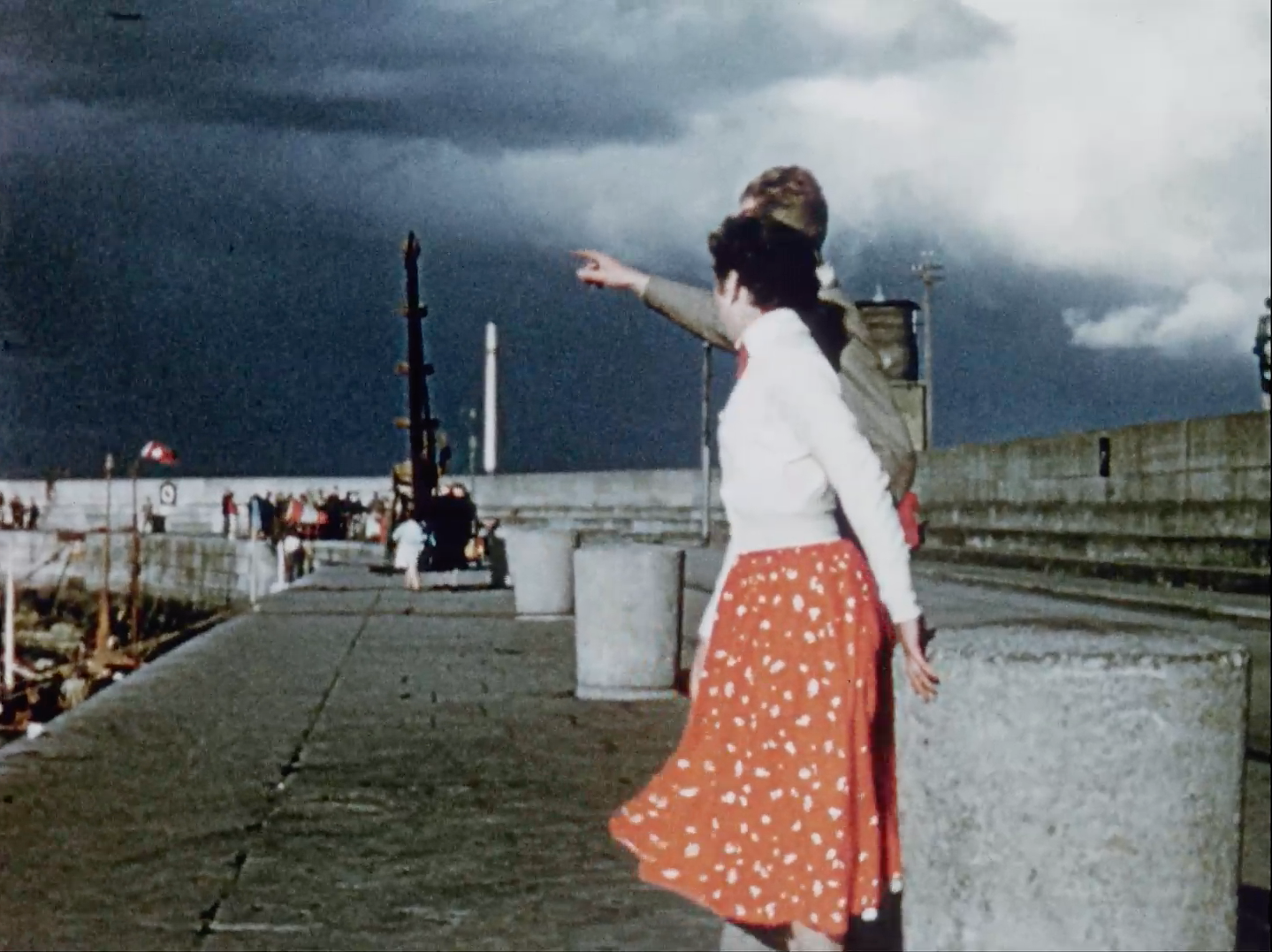By Dr Ciara Chambers
In Ireland and the UK, those of us who teach film theory and practice at academic institutions had to adapt quickly to assist students attempting to complete creative practice projects during 2020 and 2021. Suddenly the usual array of filmmaking opportunities was vastly reduced and many students no longer had the option of coordinating a team of comrades to work together in the expected way. This led to more solo projects and limited location shooting in regions that enforced tight travel restrictions (for example, for much of the pandemic Irish citizens were asked to stay within 5km of their homes).

Letter from Northern Ireland (1955). Courtesy of NI Screen & National Museums NI.
One of the creative ways of approaching pandemic filmmaking could be found in a return to the archive. Given archive footage comprises a range of formats and content that can often be viewed online, this offered an opportunity for students to juxtapose their own shots with reuse of other material in order to bolster the creative potential of their work. This style of filmmaking is by no means new – Asif Kapadia’s award-winning biopics of Amy Winehouse, Ayrton Senna and Diego Maradona rely almost entirely on archival appropriation – but most archival recycling is prohibitively expensive for non-professional filmmakers.
The Make Film History (MFH) initiative was designed to develop a new, sustainable model for the creative reuse of archive material by young filmmakers. Initially envisaged as an opening up of the archives for non-commercial use, the project was funded by the UKRI-AHRC and the Irish Research Council as part of a UK-Ireland Collaboration in the Digital Humanities networking grant. The project is led by Dr Shane O’Sullivan (Kingston School of Art) and Dr Ciara Chambers (University College Cork) and research assistant Colm McAuliffe, a doctoral candidate at Birkbeck (University of London). It builds on the success of the innovative Archives for Education project, extending the scope of the creative reuse of archive material beyond higher education to young filmmakers across the UK and Ireland. Supported by project partners the British Film Institute (BFI), BBC Archive Editorial, the Irish Film Institute (IFI) and Northern Ireland Screen, access is provided to more than 200 films which can be viewed online and then licensed through an educational or arts organisation signed up to the scheme. The funding was granted just as the pandemic began and we soon realised that we would have to move most workshops and events online. Although this was not how we had planned project delivery, it was also clear that opening up the archive in this way could offer a helpful means of alternative filmmaking to educational organisations during a challenging time for all forms of media production.

Divide and Rule – Never! (1978). Image courtesy of BFI National Archive.
So far, the resulting films have been innovative and impressive in ways we could not have anticipated. A striking example involved cross-border participants (from Derry, in Northern Ireland and Donegal, in the Republic of Ireland) recruited as part of a partnership between several arts organisations under the Making the Future initiative. Participants engaged with online workshops over two Saturdays and then worked on their own films, which ultimately juxtaposed their shots of local landscapes and urban spaces with archival footage, sometimes shot in the same locations. The films, which were screened as part of the Rathmullan Film Festival, ranged from traditional documentary to experimental formats and focussed on themes of identity, loss, responses to the pandemic and family history and participants demonstrated a remarkable proficiency in integrating archival material into their work in innovative ways. In University College Cork, the Puttnam Scholars, a group of scholarship participants who engage with seminars and mentorship provided by Oscar-winning producer Lord David Puttnam (Chariots of Fire, The Mission, Midnight Express), were halfway through completing their film project when the pandemic struck. They were able to complete their documentary with some creative interviewing and use of MFH material in time for a screening as part of the Cork International Film Festival (online) in November 2020. Other MFH events (discussions with filmmakers and archivists on the opportunities and challenges of creative reuse) have also proved popular with audiences. Archive fever: unlocking the storytelling potential of film archives was one such event, with Turner prizewinning artist Jeremy Deller, hosted in collaboration with the BFI Future Film Festival. The workshop attracted an international audience of over 600 viewers.
While we have missed engaging with filmmakers and festivals in person throughout the course of the project, we have also been grateful that we have been able to continue much of the planned activity online. In some ways, the restrictions have encouraged a welcome return to the archive, which holds within it endless possibilities for innovative and unexpected creative endeavours.
This research/project was funded by UKRI-AHRC and the Irish Research Council under the ‘UK-Ireland Collaboration in the Digital Humanities Networking Call’ (grant numbers AH/V002066/1 and IRC/V002066/1).
Dr Ciara Chambers (University College Cork) is author of Ireland in the Newsreels (Irish Academic Press, 2012) and co-editor of Researching Newsreels: Local, National and Transnational Case Studies (Palgrave, 2018). She is a member of the council of the International Association of Media and History and part of the editorial teams of the Historical Journal of Film, Radio and Television and Estudios Irlandeses. She was screenwriter and associate producer of the six-part television series Éire na Nuachtscannán. Funded by the Broadcasting Authority of Ireland, the series screened on Irish broadcaster TG4 in 2017, 2018 and 2019 www.irelandinthenewsreels.com